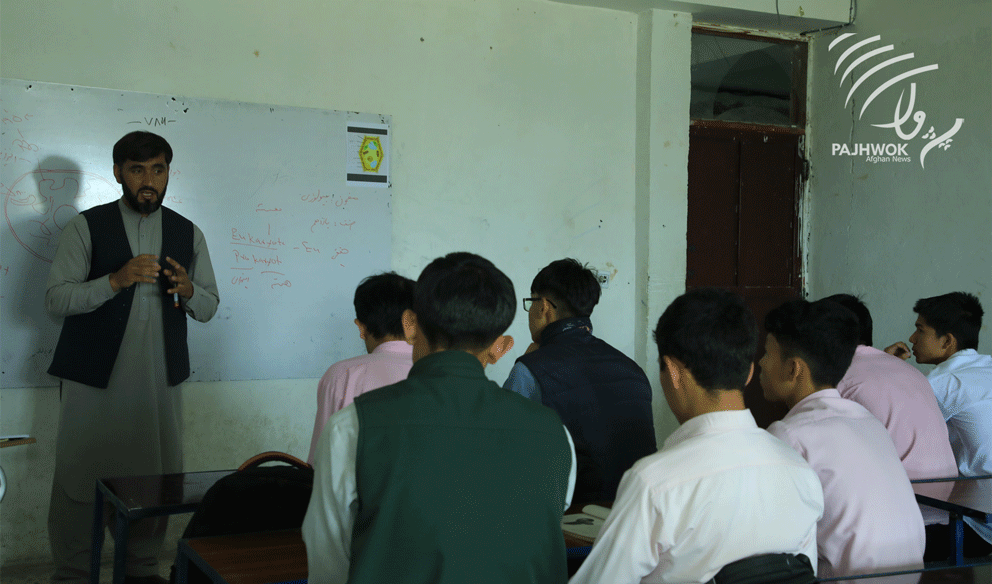KABUL (Pajhwok): After the political change in the country, private schools reduced its fee by 50 percent on the basis of different reasons and there has been an increase in the number of newly enrolled students recently in these schools.
Mohammad Haroon Rasouli, the Afghanistan’s Private Schools Union (APSU) director, told Pajhwok Afghan News that after the August 15, 2021 regime change, most of the private schools in the capital city of Kabul reduced the fees amount up to 50 percent because of economic problems but the number of the students’ enrollment in schools increased.
Rasouli emphasized that public interest in private schools was increasing day by day due to the reduction of fee and so the quality of teaching was getting better and more standardized.
However the government of the Islamic Emirate of Afghanistan (IEA) exempted only 4 percent of the private schools’ fee-duty, but the union had been experiencing more problems in paying their taxes and renewing permits prior and after the takeover by the IEA, Rasoli added.
He said: “We faced more challenges during the previous government, we tried to resolve them in meetings with the officials, especially in meetings with education minister … but unfortunately none of the problems was resolved.”
He continued: “The officials of the IEA have more sympathy on us, they try to resolve the problems that we shared with them, however some of the problems are resolved while some of them still remain unsolved, we expect that the IEA will reconsider the issues of the private schools.”
“We experience a lot of problems in renewing our schools’ licenses, we have to renew our licenses after every four years once, and getting a new license is easier than its renewal … the payment of continuous and different duties is another issue.” He added.
He said: “If the government makes the 4 percent tax exemption as a permanent discount in duties for private schools, it can help to some extent, the schools must also pay 20 percent of their fee-tax, if it is reduced to 5 or 10 percent that would be better too.”
The private schools were also bound to get an operational license from the Afghanistan Investment Support Agency (AISA), if the renewal and issuance of schools’ licenses authority is limited to the Ministry of Education (MoE) that would be better.”
However, the private schools paid 500 afs monthly tax per square meter billboard advertisement to the municipality during the previous government but the government of the IEA increased this fee to 2,000 afs, he urged authorities to reconsider the discount in this fee.
According to Rasoli’s information, right now there are about 5,000 active private schools nationwide.
The Etimad Milli Private School vice-principal Zahra Ibrahim Khel told Pajhwok, they reduced the fee of the school by 50 percent after the takeover by the IEA because of the increased economic problems, so the number of the new enrolled students increased.
For instance, she said the schools charged each student 1,500 afs monthly fee in secondary and high school level, but now this fee is reduced to 750 afs monthly.
The fee of primary level was 1,000 afs monthly which is now only half of this sum, she added.
Ibrahim Khel asked the government of the IEA to pay serious attention to the reduction of duties and simplification of licenses renewal procedures.
The founder of Talash Danish private school Baba Haidar Jafari said, his school had seven branches in Kabul and central Bamyan provinces and they also reduced the students’ fee up to 50 percent.
Referring to the increasing number of students, he said girls above grade six were allowed to study, the number of their student can probably jump higher than this. Haidar added, with the cut in students’ fee, they also reduced the salaries of their teachers by 40 percent.
Baba Haidar asked the government for cut in duties and simplification of the schools licenses’ issuance and extension procedures.
Pajhwok tried to get the viewpoint of the Ministry of Finance (MoF), Kabul municipality and the AISA authority on requests for the reduction of duties and the cut in advertisement boards’ charges and the simplification of licensing procedures but no response was provided.
The only official who commented on this was the Kabul municipality representative Nimatullah Barakzai, he said: “The tax on advertisements’ boards charges are paid to the government based on a legal regulation, only the shops are exceptionally exempted from paying this tax, but if they display more advertisement alongside the roads or on pathways, they would be dealt with in accordance with the laws.”
Aw/nh







GET IN TOUCH
NEWSLETTER
SUGGEST A STORY
PAJHWOK MOBILE APP